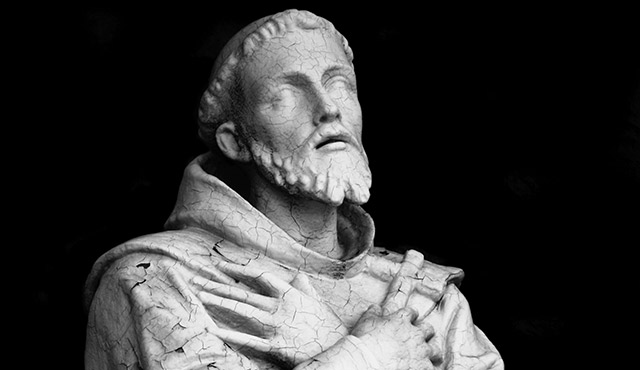In the mission statement for his papacy, Pope Francis wrote, “I prefer a Church which is bruised, hurting and dirty because it has been out on the streets rather than a Church which is unhealthy from being confined and from clinging to its own security.”
Calling to mind the life of Saint Francis of Assisi, the Holy Father’s words may inspire Catholics to make a comparison between the two men. “Many people feel that Pope Francis reflects Saint Francis, but Pope Francis is not trying to live like Saint Francis; Pope Francis is trying to live the Gospel, which is actually what Saint Francis did,” says Friar Ryan Thorton, a Franciscan and Parochial Vicar at Sts. Simon and Jude Parish in Huntington Beach. “The one is not imitating the other; rather they are both following the same playbook, which is why it is easy to see them in each other.”
Friar Ryan added that Saint Francis is someone almost everyone can identify with. “He was a poet, a peacemaker and a man of prayer; he served the poor, preached to the masses, and rebuilt churches; he went to Rome to meet the pope, went to the Holy Land to meet the sultan, and went into the depths of the human experience to see God.”
Born in 1182 in the Italian town of Assisi to a cloth merchant father, Francis spent his youth chasing after the thrills many young people do – romance, adventure, wealth and status. In his time, he was seen as a leader and a dreamer. He wasn’t particularly focused on academics but proved to be a businessman. Saint Francis traveled through Europe and eventually decided to win fame by becoming a knight.
“However, the experience of war changed Francis, and he came back from it a different man—sick, dejected and unsure of what to do,” says Friar Ryan. “It took a while for him to understand what God was calling him to, but he found a new direction for his life when he began to work with the lepers near Assisi, a group of people who had previously disgusted him.”
In Saint Francis’ time, people suffering from leprosy were not only rejected and isolated because of their black boils and truncated limbs, but many people also believed the affliction was caused by sin. Despite the harsh intolerance, remarkably, Saint Francis embraced and served lepers with humility and grace.
It was on the way back from his work with lepers that Saint Francis happened upon a neglected and crumbling church. Inside, he heard a crucifix speak to him, saying, “Go and repair my house which, as you can see, is falling completely into ruin.”
Soon after his conversion, Saint Francis proved to be a charismatic speaker and inspired many people to “preach the Gospel at all times, and when necessary, use words.” Those who decided to join Saint Francis became the Order of Friars Minor, or as they are commonly referred to, Franciscans. The order has included Saint Bonaventure, the great theologian and doctor of the Church, and the soon-to-be canonized Blessed Junipero Serra, the founder of the California Missions.
Although Saint Francis’ life has influenced many groups, including environmentalists, Friar Ryan explains that it is more accurate to say that Saint Francis was the first Christian ecologist.
“Saint Francis intuited on a deep level that all of creation is connected, connected in relation to God and connected in a familial way,” says Friar Ryan. “He expressed this reality so beautifully in his prayer ‘The Canticle of the Creatures,’ which our current Holy Father quoted in his most recent encyclical and which thus gave the encyclical its name, ‘Laudato Si’.”
Friar Ryan notes that the most significant aspect of Saint Francis’ life was poverty, but not in the way that many people think. “There is material poverty, which is not having possessions, but there is a deeper and more difficult poverty to live: the poverty of the will that is called humility,” says Friar Ryan. “This poverty is what Saint Francis practiced throughout his lifetime, and it is this poverty of the will that would change us all if we but willed it, for it is the poverty spoken of when it is said, ‘Blessed are the poor in spirit, for theirs is the Kingdom of Heaven.’”
Francis became a saint only two years after his death in 1228. “The reason why he was revered as a saint even before his death, why he was canonized immediately thereafter, and why he is still beloved today is because he dared the impossible—to actually the life of the Gospel of our Lord Jesus Christ,” says Friar Ryan.

